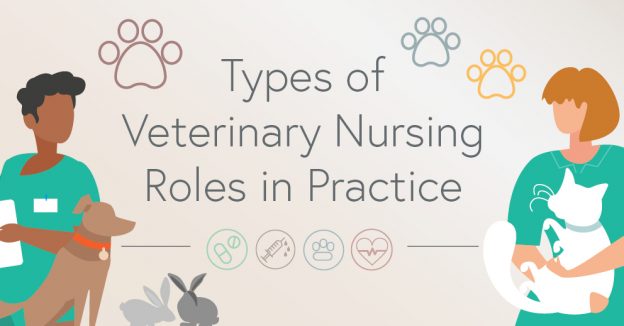Have you ever wondered what life as a veterinary nurse involves?
Outside of the consulting room, RVNs handle most of the care and attention required by our pets. Their registration with the Royal College of Veterinary Surgeons (RCVS) shows that they are responsible for their professional conduct and remaining up-to-date with their professional skills and knowledge.
Veterinary Nurses carry out nursing and technical work and perform a range of important diagnostic tests, medical treatments and minor surgical procedures under veterinary surgeon direction. Beyond technical work, RVNs also educate owners on the welfare of their pets. In many practices they run their own nursing clinics.
Read on to learn about the responsibilities of a veterinary nurse and the various nursing roles you may come across in practice.
1. Nursing care
RVNs are responsible for carrying out nursing care during the course of the case. Like nurses in NHS hospitals they perform a wide range of important tasks such as medicating patients, dressing wounds and monitoring intravenous fluids. Beyond this, RVNs also handle the basic needs of the patient including exercising and feeding your pet, cleaning accommodation and providing lots of fuss and cuddles.
2. Pet owner education and nursing consultations
Veterinary nurses undertake a rigorous training programme and continue to study throughout their careers to maintain professional expertise. Many go on to develop specialisms in areas such as dentistry, feline nursing or anaesthesia. Some also complete additional, advanced qualifications in veterinary nursing, such as the Level 5 Advanced Diploma in Veterinary Nursing (Practice Nurse). As such, many veterinary practices offer nurse-led clinics on areas including weight management, dressing changes, post-operative checks, puppy training and socialisation, microchipping and diabetic clinics.
3. Clinical supervision
Clinical supervisors are veterinary nurses tasked with supporting student veterinary nurses in practice, ensuring they are practicing safely and providing opportunities for them to complete their Nursing Progress Log (NPL) or e-portfolio to complete their veterinary nursing qualifications. Becoming a clinical supervisor is a great avenue for Continuing Professional Development (CPD) in coaching and mentoring skills, which can also pave the way to formal qualifications.
4. Diagnostic Testing and Procedures
RVNs undertake many laboratory tests in-house. They are trained to take and process x-rays as requested by the veterinary surgeon. This is often a critical step in the process of diagnosing illness or injury in your pet.
5. Veterinary Nurse Team Management
Some veterinary nurses have team management responsibilities. Head Veterinary Nurses lead veterinary nursing and veterinary care teams in practice, in order to manage day-to-day workflow efficiently. Day-to-day, this usually covers many areas in team management, for example: recruitment, development, absence reporting and monitoring. Sometimes head veterinary nurses are also involved with managing expenditure to ensure the practice is using resources cost-effectively. The role is perfect for those looking to have a bigger influence over practice life; whether that be over developing staff, customer service or clinical practice.
6. Surgical Nursing and Anaesthesia
Veterinary nurses undertake a rigorous training programme in order to assist veterinary surgeons as part of the surgical team. They monitor the levels of patient anaesthesia throughout operations. They’re able to recognise different stages of anaesthesia and potential problems, as well as legally undertake minor surgical procedures under veterinary surgeon supervision. This could be the suturing of wounds or dental scaling and polishing following assessment and removal of any damaged teeth by the vet.
-
Interested in training as veterinary nurse? Find out more here
-
Read our Ultimate Guide to a Career in Veterinary Nursing

